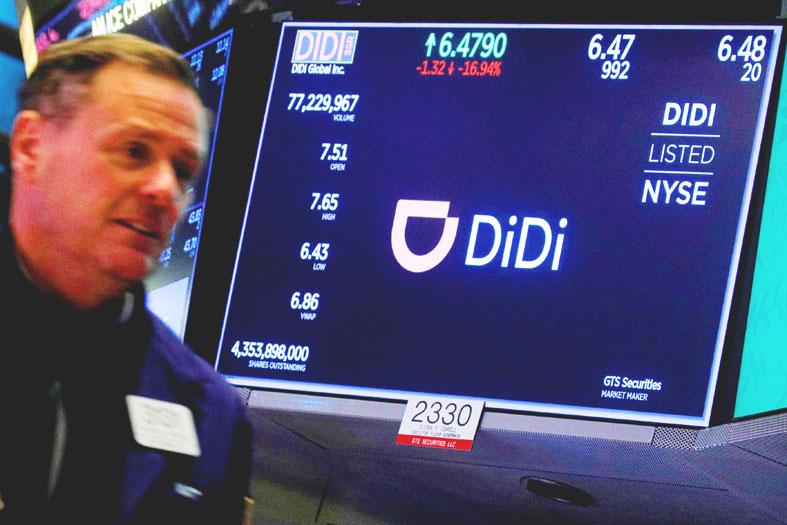Chinese ride-hailing giant Didi Global Inc (滴滴) on Wednesday reported a 1.7 percent decline in third-quarter revenue, as its domestic business took a hit from a regulatory crackdown.
Alibaba Group Holding Ltd (阿里巴巴) chief executive officer Daniel Zhang (張勇) had resigned from his post as director on Didi’s board, the company said.
He is succeeded by Yi Zhang (張毅), a senior legal director at Alibaba Group, it said.

Photo: Reuters
Chinese authorities have come down hard on Didi after its New York Stock Exchange listing in June, demanding that it took down its app from mobile app stores, while the Cyberspace Administration of China investigated its handling of customer data.
The restriction hit Didi, cofounded in 2012 by former Alibaba employee Will Cheng (程維) and backed by Softbank Group Corp, which was the dominant ride-hailing company in China.
The company now faces stiff competition from ride-hailing services by automakers Geely Holding Group (吉利控股) and SAIC Motor Corp Ltd (上海汽車).
Under pressure from Chinese regulators concerned about data security, Didi this month succumbed and decided to delist from the New York Stock Exchange and pursue a Hong Kong listing.
Shares of Didi, which soared on their initial public offering, giving the company a valuation of US$80 billion and marking the biggest US listing by a Chinese firm since 2014, have since declined 65 percent.
Didi on Wednesday said that its board had authorized it to pursue a listing of its class A ordinary shares on the main board of the Hong Kong Stock Exchange.
“The company is executing above plans and will update investors in due course,” Didi said.
Revenue for the third quarter fell to 42.7 billion yuan (US$6.7 billion) from 43.4 billion yuan a year earlier.
Didi, which is expanding its presence in Europe and South America, said that revenue from its international operations nearly doubled to 966 million yuan in the quarter. Net loss attributable to ordinary shareholders was 25.91 yuan.

Taiwan Semiconductor Manufacturing Co (TSMC, 台積電) yesterday said that its investment plan in Arizona is going according to schedule, following a local media report claiming that the company is planning to break ground on its third wafer fab in the US in June. In a statement, TSMC said it does not comment on market speculation, but that its investments in Arizona are proceeding well. TSMC is investing more than US$65 billion in Arizona to build three advanced wafer fabs. The first one has started production using the 4-nanometer (nm) process, while the second one would start mass production using the

A TAIWAN DEAL: TSMC is in early talks to fully operate Intel’s US semiconductor factories in a deal first raised by Trump officials, but Intel’s interest is uncertain Broadcom Inc has had informal talks with its advisers about making a bid for Intel Corp’s chip-design and marketing business, the Wall Street Journal reported, citing people familiar with the matter. Nothing has been submitted to Intel and Broadcom could decide not to pursue a deal, according to the Journal. Bloomberg News earlier reported that Taiwan Semiconductor Manufacturing Co (TSMC, 台積電) is in early talks for a controlling stake in Intel’s factories at the request of officials at US President Donald Trump’s administration, as the president looks to boost US manufacturing and maintain the country’s leadership in critical technologies. Trump officials raised the

‘SILVER LINING’: Although the news caused TSMC to fall on the local market, an analyst said that as tariffs are not set to go into effect until April, there is still time for negotiations US President Donald Trump on Tuesday said that he would likely impose tariffs on semiconductor, automobile and pharmaceutical imports of about 25 percent, with an announcement coming as soon as April 2 in a move that would represent a dramatic widening of the US leader’s trade war. “I probably will tell you that on April 2, but it’ll be in the neighborhood of 25 percent,” Trump told reporters at his Mar-a-Lago club when asked about his plan for auto tariffs. Asked about similar levies on pharmaceutical drugs and semiconductors, the president said that “it’ll be 25 percent and higher, and it’ll

CHIP BOOM: Revenue for the semiconductor industry is set to reach US$1 trillion by 2032, opening up opportunities for the chip pacakging and testing company, it said ASE Technology Holding Co (日月光投控), the world’s largest provider of outsourced semiconductor assembly and test (OSAT) services, yesterday launched a new advanced manufacturing facility in Penang, Malaysia, aiming to meet growing demand for emerging technologies such as generative artificial intelligence (AI) applications. The US$300 million facility is a critical step in expanding ASE’s global footprint, offering an alternative for customers from the US, Europe, Japan, South Korea and China to assemble and test chips outside of Taiwan amid efforts to diversify supply chains. The plant, the company’s fifth in Malaysia, is part of a strategic expansion plan that would more than triple